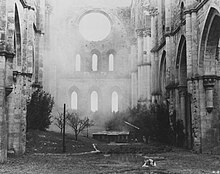Nostalghia
| Nostalghia Ностальгия | |
|---|---|
 DVD Cover | |
| Directed by | Andrei Tarkovsky |
| Written by | Tonino Guerra Andrei Tarkovsky |
| Starring | Oleg Yankovsky Erland Josephson Domiziana Giordano |
| Cinematography | Giuseppe Lanci |
Release date |
|
Running time | 125 minutes |
| Countries | Soviet Union Italy |
| Languages | Russian Italian |
Nostalghia[1] (UK: Nostalgia) is a 1983 Soviet/Italian film, directed by Andrei Tarkovsky and starring Oleg Yankovsky, Domiziana Giordano and Erland Josephson. Tarkovsky co-wrote the screenplay with Tonino Guerra.[2]
Plot
The Russian writer Andrei Gorchakov (Oleg Yankovsky) travels to Italy to research the life of 18th-century Russian composer Pavel Sosnovsky, who lived there and committed suicide after his return to Russia.[3] He and his comely interpreter Eugenia travel to a convent in the Tuscan countryside, to look at frescoes by Piero della Francesca. Andrei decides at the last minute that he does not want to enter.
Back at their hotel Andrei feels displaced and longs to go back to Russia, but unnamed circumstances seem to get in the way. Eugenia is smitten with Andrei and is offended that he will not sleep with her, claiming that she has a better boyfriend waiting for her.
Andrei meets and befriends a strange man named Domenico (Erland Josephson), who is famous in the village for trying to cross through the waters of a mineral pool with a lit candle. He claims that when finally achieving it, he will save the world. They both share a feeling of alienation from their surroundings. Andrei later learns that Domenico used to live in a lunatic asylum until the post-fascistic state closed them and now lives in the street. He also learns that Domenico had a family and was obsessed in keeping them inside his house in order to save them from the end of the world, until they were freed by the local police after seven years. Before leaving, Domenico gives Andrei his candle and asks him if he will cross the waters for him with the flame.
During a dream-like sequence, Andrei sees himself as Domenico and has visions of his wife, Eugenia and the Madonna as being all one and the same. Andrei seems to cut his research short and plans to leave for Russia, until he gets a call from Eugenia, who wishes to say goodbye and tell him that she met Domenico in Rome by chance and that he asked if Andrei has walked across the pool himself as he promised. Andrei says he has, although that is not true. Eugenia is with her boyfriend, but he seems uninterested in her and appears to be involved in dubious business affairs. Later, Domenico delivers a speech in the city about the need of mankind of being true brothers and sisters and to return to a simpler way of life. Finally, he plays the fourth movement of Beethoven's Ninth and immolates himself. Meanwhile, Andrei returns to the mineral pool to fulfill his promise, only to find that the pool has been drained. He enters the empty pool and repeatedly attempts to walk from one end to the other without letting the candle extinguish. As he finally achieves his goal, he collapses.
Cast
- Oleg Yankovsky as Andrei Gorchakov
- Erland Josephson as Domenico
- Domiziana Giordano as Eugenia
- Delia Boccardo as Zoe
- Patrizia Terreno as Andrei's Wife
- Laura De Marchi as Chambermaid
Production
This was Andrei Tarkovsky's first film directed outside of the U.S.S.R. It was to be filmed in Italy with the support of Mosfilm, with most of the dialogue in Italian. When Mosfilm support was withdrawn, Tarkovsky used part of the budget provided by Italian State Television and French film company Gaumont to complete the film in Italy and cut some Russian scenes from the script, while recreating Russian locations for other scenes in Italy.
Locations
Several scenes of the film were set in the countryside of Tuscany and northern Lazio; as the Abbey of San Galgano, the spas of Bagno Vignoni, the Orcia Valley, in the Province of Siena, the mysterious crypt of Abbadia San Salvatore on the Mount Amiata and the drowned church of Santa Maria in San Vittorino of Cittaducale, in the Province of Rieti.[4]
Reception
The film won the Prize of the Ecumenical Jury, the prize for best director and the FIPRESCI Prize at the 1983 Cannes Film Festival.[5] Tarkovsky also shared a special prize called Grand Prix du cinéma de creation with Robert Bresson. Soviet authorities prevented the film from winning the Palme d'Or,[6] a fact that hardened Tarkovsky's resolve to never work in the Soviet Union again.
Music
The film features music by Ludwig van Beethoven and Giuseppe Verdi (Requiem), as well as Russian folk songs. Beethoven's Ninth Symphony features most prominently.
References
- ^ Nostalghia is an Italian transcription of the Russian word Ностальгия [nəstɐlʲˈɡʲijə], rather than the Italian nostalgia [nostalˈdʒiːa].
- ^ At one point, Domenico questions mathematics, displaying that "1+1≠2" with two drops of olive oil. This is a reference to one of Guerra's collaborations with Michelangelo Antonioni, Red Desert.
- ^ Sosnovsky is modeled on Ukrainian composer Maksym Berezovsky.
- ^ Filming locations of Nostalghia at the Internet Movie Database
- ^ "Festival de Cannes: Nostalghia". festival-cannes.com. Retrieved 2009-06-16.
- ^ Wagstaff, Peter (2004). Border crossings: mapping identities in modern Europe. Peter Lang. p. 169. ISBN 978-3-03910-279-2. Retrieved 7 March 2011.
External links
- Nostalghia at IMDb
- Nostalghia at AllMovie
